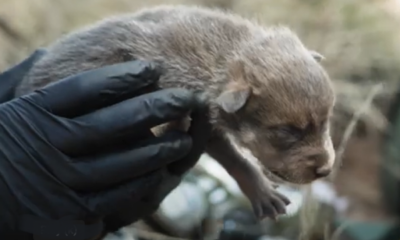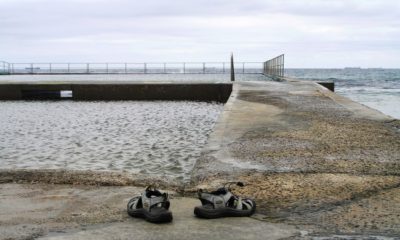Camping & Survival
How Do Experienced Outdoorsmen “Disappear”?
 When tenderfeet get lost, nobody wonders. But how do experienced outdoorsmen just “disappear”?
When tenderfeet get lost, nobody wonders. But how do experienced outdoorsmen just “disappear”?
Every year, hundreds of thousands of hunters head into the woods, and the overwhelming majority of them come home a few hours later. But every so often, experienced outdoorsmen go missing…and we’re left wondering how it could possibly have happened. A few weeks ago, we recommended a documentary called “Missing 411: The Hunted,” which explores a specific set of circumstances in which experienced hunters have been simply disappearing for hundreds of years. The documentary has a paranormal angle, but the fact of the matter is that much of the mystery can be explained by natural–but still very, very weird–circumstances. So how do experienced outdoorsmen just go “poof”?
Hypothermia
The first and most obvious reason why an experienced outdoorsperson might go missing is hypothermia. People whose body temperature has fallen beyond a certain point–usually below 95 degrees–are considered to be in Stage One of hypothermia. At this point, you’re fully awake and you feel alert. You aren’t. Hypothermia affects your cognitive function in much the same way that alcohol does, but there’s no “buzz” to let you know that your top isn’t spinning straight. Sometimes, hypothermic people simply wander off.
People sometimes rule hypothermia out because the weather was “too nice” for the missing person to have been affected. That’s a mistake. A 50-degree day with a 10-mph wind can become lethal if you fall into a stream and get your clothing soaked.
The confusion of hypothermia goes way beyond “wandering off course,” though. Sometimes victims will do two very, very strange things as their higher brain functions shut down one by one. The first is called “terminal burrowing.” The second is called “paradoxical undressing.” What happens is that, just before death, the body releases the last of its warm blood back to the extremities and the victim suddenly feels very warm. So they take off all of their clothes. Then they get the urge to tunnel down somewhere nice and safe, and they do that, and then they die. (And if they’re ever found, they’re found naked…and sometimes that takes the investigation into their death in the wrong direction.)
Fugue State
“Fugue state” sounds like a really great name for a ska band, but it’s also a really great way to get lost and never get found. Fascinatingly, there seems to be something about the human psyche that reacts very, very badly to the realization that one has been separated from one’s tribe. Put simply, “Humans Totally Freak Out When They Get Lost.” What’s more, this happens to literally everyone regardless of their level of outdoors experience. From the article:
“Ralph Bagnold, a pioneer of desert exploration in North Africa during the 1930s and 1940s and founder of the British Army’s Long Range Desert Group, recalled being seized by “an extraordinarily powerful impulse” to carry on driving, in any direction, after losing his way in the Western Desert in Egypt. He considered it a kind of madness. ‘This psychological effect … has been the cause of nearly every desert disaster of recent years,’ he wrote. ‘If one can stay still even for half an hour and have a meal or smoke a pipe, reason returns to work out the problem of location.'”
So, we know that sometimes lost people will ignore all of the sage advice to stay put and just run like Hell. But that’s not all. Sometimes they actively hide from rescuers…and if they’re found, they won’t be able to articulate why. From the article:
“Stories of people walking ‘trance-like’ past search parties, or running off and having to be chased down and tackled, are part of search and rescue lore. Ed Cornell, the psychologist who studies lost person behavior, says it is very difficult to interview someone just after they’ve been found: ‘They are basically scrambled’ and can remember little about what happened to them.
The Takeaway
What’s the takeaway? Well, it seems that Douglas Adams’ Hitchhiker’s Guide to the Galaxy book cover had the right idea: DON’T PANIC. As we just learned, however, that advice is easier said than followed. There’s a very simple, easy-to-remember concept that they teach kids, and that is that “If you get lost, hug a tree.” The idea is just to force yourself to hold still for just a few minutes, which is generally going to be enough time to let that panicky fugue state pass. Then, once you’re calm, do whatever you need to do to get and stay warm…even if it’s not all that cold.
-

 Hunting2 months ago
Hunting2 months agoDrain the Swamp: Corruption Scandal at Washington State’s Fish & Wildlife
-

 Adventure3 weeks ago
Adventure3 weeks agoDoes the “Big Beautiful Bill” Have a Public-Lands Wart?
-

 Adventure1 month ago
Adventure1 month agoHowling in Cuckoo: How Mexican Wolves are Fostered
-

 Gear1 week ago
Gear1 week agoLet Freedom RING! Primary Arms’ Independence Day Category Sale Starts NOW
-

 Adventure3 days ago
Adventure3 days agoREACTION: Trump’s Make America Beautiful Again Agenda
-

 Adventure2 weeks ago
Adventure2 weeks agoU.S. Bighorn Sheep Going Home to Canada
-

 Adventure2 months ago
Adventure2 months agoGoing Rodeo! BANISH Named the Professional Rodeo Cowboys’ Official Suppressor
-

 Adventure1 month ago
Adventure1 month agoYour Dream Hunt Could Be a Movie & Leupold Can Help





